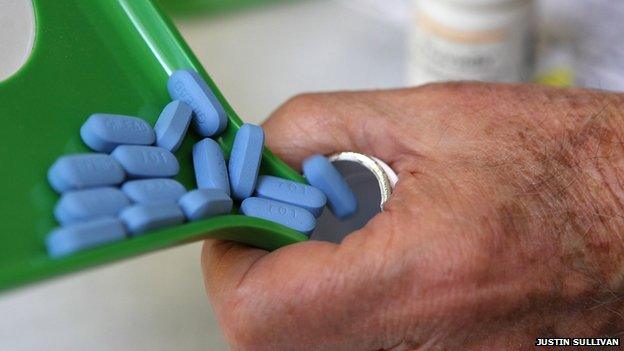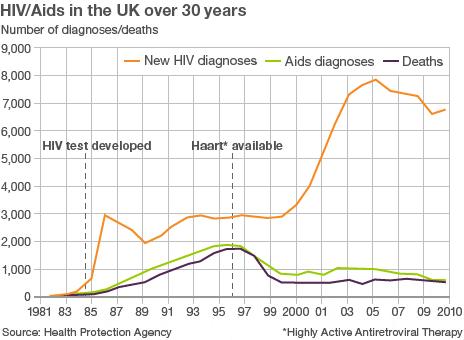Analysis: An HIV 'game changer'?
- Published

There is excited talk today that we have reached a "game changing" moment in controlling the HIV epidemic.
This is not a cure or vaccine, but a highly effective way of preventing transmission of the virus.
The idea is to give HIV drugs to gay men having unprotected sex while they are still uninfected.
It means the medicine is there waiting for the virus to arrive and kills it when it does.
Therapy
The approach relies on one of the biggest breakthroughs in the field - antiretroviral drugs.
HIV infection was a death sentence when it was first reported in the 1980s (it had gone largely unnoticed in Africa for decades before).
Every patient would progress to Acquired Immunodeficiency Syndrome (Aids) and death was inevitable.
But just look at the impact effective medicines had when they were introduced in the late 1990s.

Deaths from Aids dropped dramatically.
HIV infection has gone from guaranteed killer to life-long infection, at least in the west where the medicine is available.
Those drugs have certainly had one "game-changer" moment, they may be about to have another in patients at risk of HIV.
High risk
Having ever-growing numbers of people who are living with HIV does create a problem - a higher risk of the virus being spread.
Imagine one in eight of the sexual partners in your lifetime had HIV.
Those are the odds faced by gay men in London, the figure is closer to one in 26 for the rest of the UK.
It's why one man told me he feels at high-risk of HIV just by being in London and that it has a crippling effect on forming relationships.
Many people would say "use a condom".
They are an incredibly effective barrier to HIV transmission and recommended by every sexual health expert you can find.
But like many health messages - don't smoke, exercise more, drink less - they are often ignored.
One analysis found only 55% of men reported using a condom the last time they had sex with another man.
Some will be in long-term caring monogamous relations, some are gambling with terrible odds.
The result is the number of new HIV infections in gay men has been consistently above 2,500-a-year for a decade and they remain the most at-risk group in the country.
Dramatic fall
The trial by the UK's Medical Research Council and Public Health England showed that giving HIV drugs while the men were still healthy led to a 86% fall in new infections.
Be in no doubt that is huge.
If we were discussing a medicine that prevented 86% of cancers we'd be calling it a miracle drug.
The study showed that one case of HIV would be prevented for every 13 men treated for a year.
One member of the research team gave an extreme example saying that if the drugs were given to "all men and all were adherent then we could stop the epidemic".
These drugs are never going to be prescribed on that scale.
But they have the potential to prevent hundreds of new infections where nothing else seems to work.
That's why it has been described as a game changer.